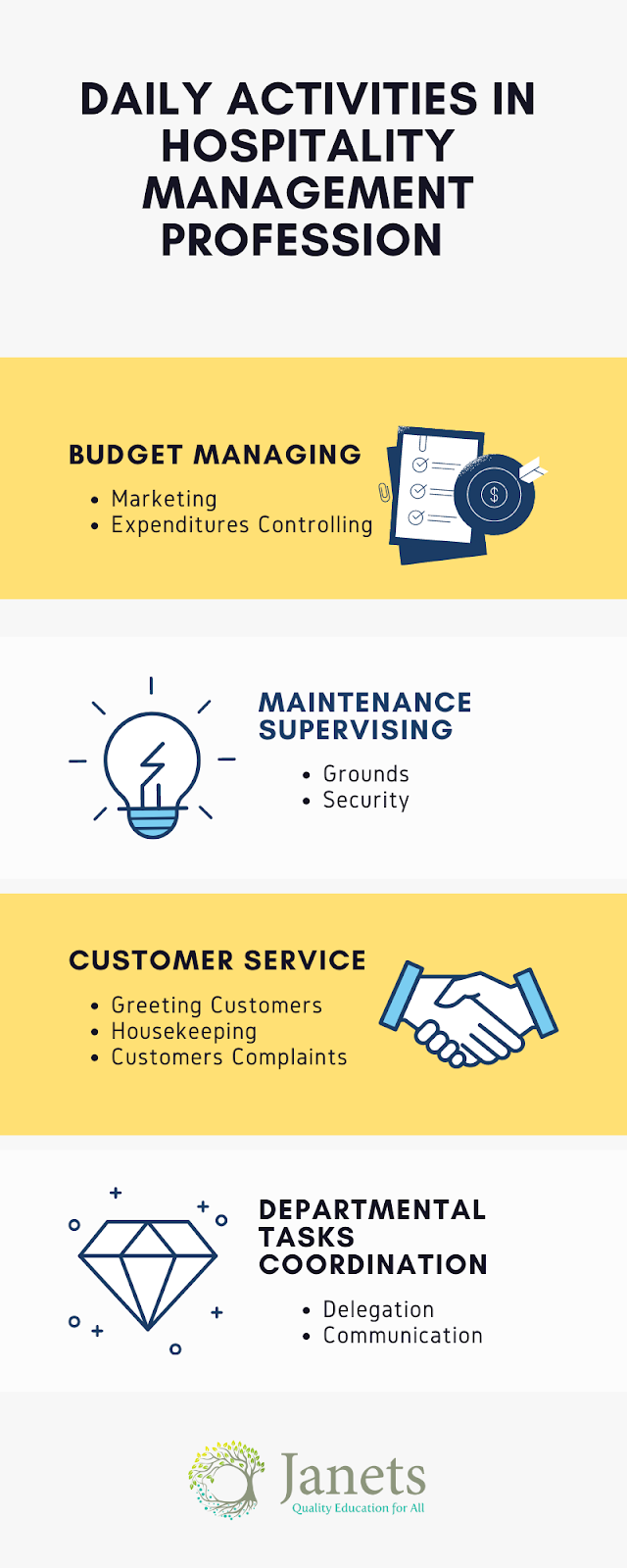- Home
- Career Guide
- What Is Hospitality Management: Is It The Right Career For You?
What Is Hospitality Management: Is It The Right Career For You?

Are you thinking about a career in hospitality management? Then, you have come to the right place. Hospitality Management is a very diverse career path. So it’s wise to learn everything about it before deciding to pursue a career in this industry.
A career in this field will expose you to a lot of opportunities. Due to the emergence of large numbers of hotels, restaurants and hospitality agencies, this has become an up-and-coming career field. This article will cover all the information about this industry in detail and give you a good hint of the role itself.
Table of Contents
What is Hospitality Management?
Hospitality Management is a career that involves managing hotels, resorts, and lodging industries. Professionals who are in this hospitality management play role in managing different guest hospitality.
They are most often in charge of teams that include front desk staff, housekeeping, and sales. In addition, great hospitality managers take note of how much their guests enjoy themselves. As a result, they seek new means of improving every part of a trip as much as possible.

Hotels, motels, resorts, and condos are also significant hospitality management properties. However, you can also find hospitality managers serving in casinos, private carriage, retail, food, drink, etc.
Many times people confuse hospitality management with hotel management. But there is some apparent difference between them. The most notable difference is in scope. Hospitality management includes anything from accommodation and entertainment to retail.
However, as the title implies, hotel management is mainly confined to hotels. On the other hand, this does not mean that a wide range of forms, brand models, and prospects are not available inside the hotel management.
Daily Activities of the Professionals Involved in Hospitality Management
You might need to supervise several departments as the manager of a hotel or spa. For example, the front desk, housekeeping, concierges, a kitchen and room service. Also, budgeting, finances, cleaning, and guest services are inclusive.

Additionally, it is the responsibility of the hospitality manager to organise and incorporate these units. After all, you don’t want the manager checking into a room that hasn’t yet been cleaned by housekeeping. For this, hospitality management always has to be updated with the right information in real-time.
Depending on the company’s size, a career in hospitality management will include a variety of responsibilities. While the job description for these responsibilities varies, there are five core responsibilities that a hospitality manager may have to administer.
Budget Managing
Every business needs to follow a budget to ensure that everything is running efficiently.
The Hospitality Manager’s responsibility is to allocate adequate funds to all departments. Thus, it helps to maintain an effective workflow against the company’s goals. Overseeing marketing efforts and controlling budgets are two primary responsibilities.

Marketing
Another essential aspect that a Hospitality Manager must oversee is marketing. To succeed in the hospitality industry, people must know that a spa, cruise ship, pub, country club, or amusement park etc. exists in your establishment.
Innovative campaigns can’t be planned and strategised if there isn’t funding to back them up. Therefore, when planning a marketing budget, the following must be taken into account:
Expenditures Controlling
Each department in hospitality management has a budget requirement. Even with the most ambitious budget, it is impossible to meet all financial needs. However, it would be impossible to make a profit or gain organisational objectives without budget planning and control.
The Hospitality Manager must be informed of all expenditures. And if they have already set a budget, they should know how each department invests their allotted funds.
Customer Service

Having a guest check-in for the first time is very difficult. But, it’s even harder to turn them into returning customers. By providing exemplary customer service, repeated business can be guaranteed, regardless of the cost of lodging. For instance, if you have had a pleasant encounter with an institution, you will be more likely to come back and recommend it to your friends and colleagues.
Greeting Customers
We all know the first impression is highly important. Especially in the hospitality industry. The ultimate aim of hospitality is to make temporary lodgings feel like permanent ones. It is accomplished by recognising their presence and making them feel welcome and, most importantly, desired. On the contrary, the tone of good customer service lies in the fact that each guest feels welcomed while checking in to a hospitality facility.
Housekeeping
Again, no matter how brief the stay is, guests must feel their accommodation is a home away from home. It will make all the difference if every room (particularly the bathroom) is spotless, draped in fresh linen and has disinfected kitchenette utensils. It’s crucial to keep an eye on the cleaning crew to make sure they’re doing their jobs well and keeping the place tidy.
Customers Complaints
Guests spend money from their hard-earned pay cheques. The least they expect is to get all promised services. But, if the services provided are unsatisfactory, they will have complaints. Thus, it is the responsibility of the hospitality manager to discover why this has happened and will take the initiatives to resolve it.
Maintenance Supervising
The Hospitality Manager is responsible for ensuring that everything in the facility works and is safe.

Grounds
The hospitality industry encompasses not only a company’s internal operations but also its external operations. Visitors are attracted to a resort that has strong visual appeal. It is also necessary to ensure that people can visit the grounds without being injured.
A hospitality manager generally has to supervise indoor and outdoor restoration projects.
Security
A Hospitality Manager may be responsible for hiring the best security for their institution. Proper security is necessary to provide the best service while ensuring security.
Regrettably, not everyone is well-mannered. But, having security guards patrol the perimeters helps guests feel comfortable and secure. Even if local law enforcement is on standby to assist with any general requirements, it’s essential to take precautionary measurements.
Departmental Tasks Coordination
As mentioned above, in the hospitality industry, there are several departments. Therefore, it may be necessary to supervise various departments by assistant hospitality managers, depending on how big and demanding a department is.

The Executive Hospitality Manager’s attention may be required by the Human Resource Department and Finance Controllers at the same time. That’s why having an Assistant Hospitality Manager can be helpful. The Executive Hospitality Manager’s primary role is to guarantee that all of these departments work well.
Delegation
Delegation is a skill that all excellent managers possess. You have to delegate tasks efficiently to different people in the unit. As the head manager, you will have a duty of decision-making and competence. So, having your assistant execute more ordinary or repetitive jobs is not a threat.
Communication
Keeping track of dates and events allows you to plan your communications ahead of time. It gives you extra time to prepare and ensure that the people you need are available.
Hospitality Management Jobs You can Get
There is a wide range of categories in hospitality management jobs. The average salary for a Hospitality Manager is £25,052 per year. However, there is variation in pay according to the job requirement. Among these jobs, you will find some significant job descriptions here.
1. Guest Relations
Guest relationship jobs can be a perfect career for individuals who like to interact and work with people. These jobs are available in various industries, but they are most common in hotel management.

Front Office Manager
Front office managers may be responsible for various tasks daily. Such as, supervising employees, maintaining guest accounts, coordinating hotel sales, and so on.
Directors of Housekeeping
Directors of housekeeping jobs are typical in hotels and are required to manage the cleanliness and look of the hotel. They also regulate labour expenses and manage supplies, among other related obligations.
What is Hospitality Management?
As exquisite wine specialists, sommeliers might be recruited at high-end hotels or restaurants. They can suggest wine and food combinations, assist chefs in creating up-to-date wine lists for their facility, or promote wine-related events.
2. Food and Beverage Industry
There are two main areas of the food & beverage industry: the manufacturing and distribution of edible products. Food and beverage jobs are related to hospitality and may be available in restaurants, factories, event centres, and more.

Restaurant Manager
There is a need for restaurant managers everywhere because of the increase in restaurant business. Restaurant managers are needed to supervise various restaurant types, ranging from local taverns to high-end restaurants. And they are definitely vital for fine-dining establishments specialising in international cuisine.
Sous Chef
A Sous chef is another career in the food and drinks business, which is the kitchen’s second-in-command function. Therefore, as a Sous chef, you will work under the head chef’s supervision and is in charge of various meal preparations and kitchen activities.
3. Tourism Management
Tourism management is one aspect of hospitality management that offers a wide range of opportunities. Job options such as cruise ship director and flight attendant can take you across the world. But if you want a hospitality career with a stable home base, the three ideas below can be your choice.
Travel Agent
A travel agency helps individuals, couples and groups to make plans for vacations. Finding accommodations, planning excursions, and discussing airfare savings are all possible steps in this process.
Marketing and Public Relations
Marketing and public relations careers are available in both hospitality and tourism based on the industry’s needs. These jobs are vital because a positive media name can influence visitors to a tourist town or hotel.
Conclusion
A hospitality management career can be one of the most challenging and exciting choices for you. It has enormous career growth opportunities as well as role diversity. Unlike many other jobs, the daily tasks aren’t monotonous. Most importantly, you can interact with a diverse group of people and socialise.
To learn more and better prepare for a career in this industry, take this Hospitality Management Bundle for Travel and Tourism: 7 Courses in 1. It can be beneficial for you to know more about hospitality management and the hospitality industry.





 LOGIN/Sign up
LOGIN/Sign up


